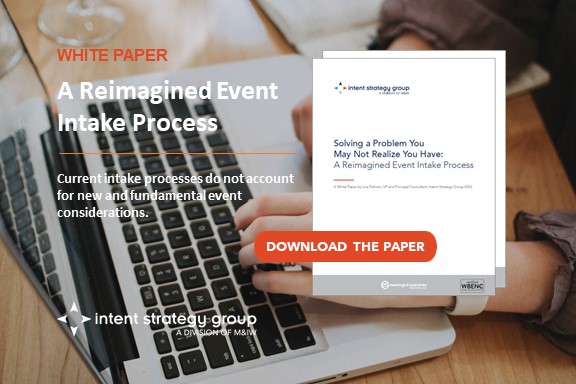Is Your Intake Process Holding You Back?
The silver linings of industry disruption include new perspectives on old processes and a demand to intentionally redesign what is no longer working. Reimagining your event intake process might be solving a problem you didn’t even know you had.
Intent Strategy Group, the independent consulting division at Meetings & Incentives Worldwide, released a special white paper on the effects of utilizing an outdated intake process within a strategic event program. The findings focus on how evolving traditional processes post-pandemic can directly and positively affect the entire workflow.
“Our businesses, people, and technologies are constantly evolving, and events are no different. Event owners need more situational awareness, scrutiny, and guidance, and that was a step rarely taken in pre-pandemic automated workflows. These decades-old processes are well overdue for a redesign.”
Lisa Palmeri, Vice President, Intent Strategy Group
Paradigm Shift Demands an Evolution of Event Processes
Traditionally, meeting and event processes, and the business rules designed to automate them, default to assume most events would occur in-person. Today, that default no longer applies. A balanced portfolio of formats—virtual, hybrid, and in-person events—exists and will define most post-pandemic Strategic Event Programs moving forward.
Our industry faces a paradigm shift demanding an evolution of event processes. It starts with a more consultative intake process to guide requesters to the best format and delivery approach for their event.
How does an outdated intake process disrupt overall event program strategy?
The intake process is the foundation of Managed Event Program success. To be effective and create efficiencies, it needs to consider the nuances of today’s most in-demand event types and services. Today’s intake processes do not account for new and fundamental event considerations, which can:
- Jeopardize adoption,
- Cause some events to bypass the process altogether,
- Lead to missing or erroneous data, and
- Diminish the benefits of a strategic events program.
What are the shortcomings of traditional intake processes?
Traditional intake processes aren’t considering the most prevalent event approaches, technology needs, and audience types.
- Event visibility, data, and professional management are inadequate.
- The experience is not intuitive or user friendly.
- Forms are cumbersome, unclear, or irrelevant.
- Requesters lack information required at the time of submission.
- Premature or incomplete event requests cause unnecessary work.
- Workflows designed for in-person events can be disjointed.
- Processes don’t easily support small/simple events.
- There isn’t a seamless integration with a small/simple event technology.
What are the consequences of doing nothing?
Modern events require more careful forethought and professional guidance to understand the operational options available. Sticking with the status quo can result in negative program consequences, including:
- Disengaged stakeholders
- Missed program ROI and lost savings opportunities
- Heightened risk, especially in contracting and duty-of-care
- Lost opportunity to support event sustainability goals
- Diminished productivity
Determining the best format—in-person, virtual, or hybrid—requires strategic analysis of impact factors and variables. While platforms such as Cvent (specifically in their Access Portals upgrade), Bizly, and Lenos have made recent enhancements to their Request or Intake Form functionality, the form is only one aspect of the solution.
What’s the solution?
Lisa Palmeri, Vice President and Principal Consultant of Intent Strategy Group (ISG), a division of M&IW, outlines a solution as well as the outcomes and benefits in Solving a Problem You May Not Realize You Have: A Reimagined Event Intake Process. This white paper explores the findings of multiple customer success stories and defines a multi-step solution towards evolving the intake process and workflow.
Ready to take the next step? Contact ISG to help streamline your event intake process.

Contributor

Lisa Palmeri, Vice President and Principal Consultant
Intent Strategy Group
About Intent Strategy Group
Intent Strategy Group (ISG) is an independent consulting division of Meetings & Incentives Worldwide that guides organizations through the development of strategic event management programs as well as the optimization and implementation of meetings and event technology solutions. Learn more about Intent Strategy Group.

